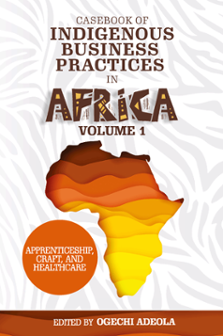
Index
Casebook of Indigenous Business Practices in Africa
ISBN: 978-1-80262-252-2, eISBN: 978-1-80262-251-5
Publication date: 16 August 2023
Citation
(2023), "Index", Adeola, O. (Ed.) Casebook of Indigenous Business Practices in Africa, Emerald Publishing Limited, Leeds, pp. 259-266. https://doi.org/10.1108/978-1-80262-251-520231024
Publisher
:Emerald Publishing Limited
Copyright © 2023 Ogechi Adeola. Published under exclusive licence by Emerald Publishing Limited
INDEX
- Prelims
- Chapter 1 Introduction: A Casebook of Indigenous Business Practices in Africa
- Part 1 Apprenticeship Models and Practices
- Chapter 2 Exploration of Apprenticeship and Business Succession Models in Nigeria, Ghana and the Benin Republic: A Cross-Case Analysis of Selected Ethnic Groups
- Chapter 3 Apprentice Training, Mastership and Managerial Development of the Igbo Entrepreneurs in Nigeria
- Chapter 4 Case Studies on Business Ethics and Values: Insights From the Southeastern Igbos of Nigeria
- Part 2 Indigenous Craft Enterprises
- Chapter 5 The Cultural and Creative Industries in Ethiopia: A Case of Cultural Lifestyle Items Producer
- Chapter 6 Market Revival and Sustainability: Lessons for Business Actors From the Case of Kiliim Social Enterprise, Egypt
- Chapter 7 An Examination of Indigenous Business Incubators: A Case of Kente Weaving Industry in Ghana
- Chapter 8 Cultural and Socio-Economic Impact of the Indigenous Garment Industry: A Case of Smock Dealership in Tamale, Ghana
- Part 3 Healthcare
- Chapter 9 Placing Indigenous Knowledge at the Core of Production and Marketing of Medicinal Plant (Mpesu) in Zimbabwe and South Africa
- Chapter 10 Indigenous African Healing Practices as a Resource for Entrepreneurial Promotion: Insights From Tsonga Traditional Health Care System in South Africa
- Chapter 11 Sustaining the Trade Ingenuity of Female Herbal Producers (FHPs) in Southwest Nigeria: Lessons From the COVID-19 Pandemic
- Part 4 Conclusions and Recommendations
- Chapter 12 The Somali Business Orientation: Key Lessons and Recommendations for Africa From the Kenyan Somali Practice
- Chapter 13 Advancing Indigenous Knowledge and Building Sustainable Business Structures in Africa
- Index